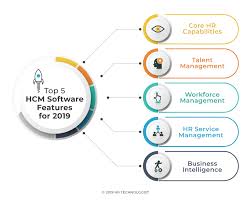Human Capital Management (HCM) Software Market: An In-Depth Analysis
The Human Capital Management (HCM) software market has witnessed substantial growth over recent years, driven by the increasing demand for efficient and integrated HR solutions. This article delves into a comprehensive overview of the HCM software market, its key segments, recent industry news, prominent companies, market drivers, and regional insights.
Market Overview
Human Capital Management (HCM) software is designed to streamline and automate HR processes, encompassing talent acquisition, performance management, learning and development, and employee data management. The human capital management (HCM) software market industry is projected to grow from USD 16.7 billion in 2022 to USD 28.9 billion by 2030, exhibiting a compound annual growth rate (CAGR) of 8.20% during the forecast period (2024 - 2030).
Request To Free Sample of This Strategic Report - https://www.marketresearchfuture.com/sample_request/1425
Key Market Segments
The HCM software market is segmented based on component, deployment mode, organization size, end-user, and region.
-
Component:
- Software: Core HR, Talent Management, Workforce Management, and Payroll.
- Services: Implementation, Support and Maintenance, Training, and Consulting.
-
Deployment Mode:
- On-Premises: Suitable for organizations with specific security and customization needs.
- Cloud-Based: Increasingly popular due to its scalability, cost-effectiveness, and ease of access.
-
Organization Size:
- Large Enterprises: Require comprehensive HCM solutions with advanced features.
- Small and Medium-Sized Enterprises (SMEs): Opt for scalable and budget-friendly solutions.
-
End-User:
- BFSI (Banking, Financial Services, and Insurance)
- IT and Telecom
- Healthcare
- Retail
- Manufacturing
- Government
- Others
Industry Latest News
The HCM software market is dynamic, with several notable developments:
- Acquisitions and Mergers: Major players are expanding their market reach and capabilities through strategic acquisitions. For example, Workday acquired Peakon to enhance its employee engagement capabilities.
- Technological Advancements: Integration of Artificial Intelligence (AI) and Machine Learning (ML) in HCM solutions is on the rise, providing advanced analytics and predictive insights.
- COVID-19 Impact: The pandemic has accelerated the adoption of remote working solutions, driving demand for cloud-based HCM software to manage distributed workforces efficiently.
Key Companies
Several companies dominate the HCM software market, known for their innovative solutions and extensive market presence:
- SAP SuccessFactors: Offers a comprehensive suite of HR solutions, known for its robust analytics and user-friendly interface.
- Oracle HCM Cloud: Provides integrated HR solutions with advanced AI capabilities.
- Workday: Renowned for its user-centric design and strong focus on employee engagement.
- ADP Workforce Now: A popular choice among SMEs for its payroll and workforce management solutions.
- Ultimate Software (UKG): Known for its powerful HR, payroll, and talent management solutions.
- Ceridian: Offers Dayforce, an HCM platform with a strong focus on continuous pay and real-time data.
Market Drivers
The growth of the HCM software market is propelled by several key drivers:
- Digital Transformation: Organizations are increasingly adopting digital tools to enhance HR processes, driving demand for sophisticated HCM solutions.
- Workforce Analytics: The growing importance of data-driven decision-making in HR is boosting the adoption of analytics-driven HCM software.
- Cloud Adoption: The shift towards cloud-based solutions for their scalability, cost-efficiency, and remote access capabilities.
- Regulatory Compliance: Increasingly complex labor laws and regulations necessitate the use of advanced HCM software to ensure compliance.
- Employee Experience: A focus on improving employee engagement and satisfaction is driving the adoption of HCM solutions that offer a better user experience.
Ask for Customization - https://www.marketresearchfuture.com/ask_for_customize/1425
Regional Insights
The HCM software market exhibits significant regional variations, with North America, Europe, Asia-Pacific, and the Rest of the World showing distinct trends and growth patterns.
-
North America:
- The largest market for HCM software, driven by high adoption rates of advanced technologies and the presence of major market players.
- The U.S. leads the region, with organizations prioritizing digital transformation and employee experience.
-
Europe:
- A mature market with significant growth opportunities, particularly in Western Europe.
- Strong regulatory frameworks and the focus on GDPR compliance drive the demand for sophisticated HCM solutions.
-
Asia-Pacific:
- The fastest-growing region, driven by the rapid economic growth and increasing digitalization in countries like China, India, and Japan.
- SMEs in the region are increasingly adopting cloud-based HCM solutions to enhance their HR capabilities.
-
Rest of the World:
- Regions like Latin America and the Middle East & Africa are experiencing growing adoption of HCM software, albeit at a slower pace compared to other regions.
- Emerging markets in these regions offer significant growth potential for HCM vendors.
Conclusion
The Human Capital Management (HCM) software market is poised for substantial growth, driven by technological advancements, increasing digitalization, and the growing emphasis on workforce analytics and employee experience. As organizations continue to navigate the complexities of modern HR management, the demand for comprehensive, integrated, and user-friendly HCM solutions will only intensify. Key market players are expected to leverage AI, ML, and cloud technologies to deliver innovative solutions that meet the evolving needs of businesses across the globe. With significant opportunities across various regions, the HCM software market is set to remain a critical component of organizational success in the years to come.
Human Capital Management Software Market Highlights:



